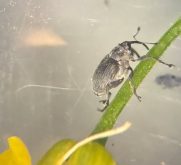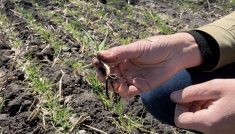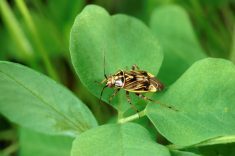Keystone Agricultural Producers’ president Doug Chorney is anxious to see details on how the Manitoba government will better protect farmland from noxious weeds as part of its ban on cosmetic pesticides.
“I am encouraged by that, but we want to make sure that is the case,” Chorney said July 3 in an interview.
“It’s important that it’s not forgotten. We’re not just talking about dandelions in Assiniboine Park.”
Chorney was responding to the government’s June 28 announcement that it will introduce legislation in the fall banning “synthetic chemical lawn pesticides,” with the exceptions of “agricultural lands and gardens, golf courses, sod farms, and addressing high-risk noxious weeds and poisonous or invasive species.”
Read Also

Tie vote derails canola tariff compensation resolution at MCGA
Manitoba Canola Growers Association members were split on whether to push Ottawa for compensation for losses due to Chinese tariffs.
The bill will become law in December 2014 with a one-year grace period, the government said in a news release.
Besides plans to tackle noxious weeds, Gord Mackintosh, minister of Manitoba conservation and water stewardship, said his plan includes a strict integrated pest management program for all government pesticide applications beginning December 2013, consumer and applicator awareness about effective lawn biopesticides and organic practices and consultation with the education and child-care centre sectors to significantly reduce indoor pesticide exposure.
It’s unclear how weeds will be controlled on public property, including along provincial highways, provincial and municipal roads and utility rights of way, Chorney said.
The government has been reviewing the Noxious Weed Act, which currently obliges landowners to control weeds defined under the act as noxious. In an email last week a government official said the province wants to “focus on those noxious weeds that have greater harm to food production.”
Chorney said he fears the province will remove a number of weeds from the act to make enforcement easier.
“Right now there is very inconsistent enforcement across the province,” he said.
Once the proposed bill takes effect only federally approved biopesticides will be legal to use on lawns, driveways, sidewalks, patios, school grounds, playing fields, playgrounds used predominantly by children and health-care facility grounds.
“Medical experts are clear that synthetic chemical lawn pesticides pose risks to human health, especially in the early stages of life, and to pets as well,” Mackintosh said in a release. “We must reduce exposure to these products where they are not needed. Given the increasing availability of replacement products and alternative turf management practices that effectively control weeds, Manitoba is proposing to join most other provinces and more than 170 Canadian municipalities to protect human, pet and environmental health.”
But Chorney said the pesticides on the market were studied by the federal government’s Pesticide Management Regulatory Agency and deemed safe when applied according to label directions.
According to Chorney some of the biopesticides the government is promoting, such as EcoSense, are as toxic as the herbicides being banned outside of farm use.
“The toxicity of EcoSense compared to glyphosate and Killex (2,4-D, mecoprop and dicamba) is identical,” he said. “So what are we really changing here in terms of public protection?
“I’ve also read you have to apply it six or seven times a season to get control. If you’re putting 25 times the product on six times a year how is this safer?”
All pesticides are toxic, but safe when used properly, he said.
Prohibiting the use of pesticides on lawns sends the public the wrong message, Chorney said. If people decide they are unsafe on their grass, they start to question whether they are safe on food crops.
A ban will only drive pesticide use underground, he added, making it even less safe as users won’t have retailers to instruct them on proper use or the proper label when pesticides are transferred to a different container.
And then there’s the issue of enforcement.
“I know the province doesn’t have the resources to have the dandelion police drive around looking for clean lawns and then proving if the guy dug every dandelion out or he sprayed,” Chorney said.
Mackintosh said the emphasis will be on educating the public about the alternatives to synthetic pesticides.
Enforcement will be considered during the drafting of the legislation and regulations, a government official said in a news release.















